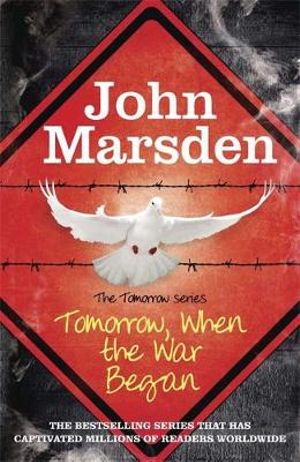There are not many books that I've run to purchase within the first fifty pages, but I was so sold on the Tomorrow Series that I purchased all seven of them within an hour of starting this book.
(And just because I want to show off, look at how much prettier the cover is on my purchased copy!
I was so dubious about starting 'Tomorrow, When The War Began' that I've been putting it off for... about seven years. Or at least it's been seven years since it was recommended to me by a good friend; only a couple of months since I went through the effort of tracking it down. But now I've read it, I really can't understand why. Perhaps it was because I just didn't see the appeal in this genre of novel back then. 'Tomorrow...' is about a war, as I'm sure you've gathered, but it's more on the realistic and emotional side of the spectrum to most of the dystopian fiction that I've seen people draw parallels to. It tells the story of seven Australian teenagers (Ellie, Corrie, Kevin, Homer, Fi, Robyn and Lee) who take a last minute trip to the bush before the end of the school holidays and who, after returning from that trip, find their homes abandoned and their town invaded and attacked.
If, like I was, you're automatically feeling put off by the words 'war' and 'invasion', you need to give this book more of a chance. The characters all mature and change so quickly it could almost be described as a coming-of-age novel and, despite the fact that it all occurs under such harrowing circumstances, they are much better people at the end of the novel than they were before the events took place. It even feels current, despite the fact that it was first published nearly twenty years ago. Some books start to feel out-dated almost immediately after publication but, ignoring the multiple references to the ancient device of the Walkman, this still feels like it could be happening somewhere in the world right now. Another aspect that makes it feel recently published is that, even though it's a life or death situation, there is quite a bit of romance (examples being the relationship with Corrie and Kevin, Homer's growing feelings for Fi and Ellie's torn feelings between Homer and Lee) demonstrating that, despite the fact that it outdates them quite starkly, it's in the same vein as the 'Divergent', 'The Hunger Games' and 'Eve' trilogies.
The fact that it feels like it could be going on somewhere in the world right now caused me to automatically draw links to the more stereotypically violent countries: namely Iran, Iraq and Afghanistan. However, John Marsden's writing is unique in the fact that he never (at least, not before the end of the first book) reveals who has invaded the country. We know that the friends don't know their language, so we know that they are from a foreign country, but it doesn't turn into a propaganda like attack on a country that the author has a personal vendetta against which really impresses me. Not that I'm saying it's likely that every author has an agenda in mind when writing a novel, but a lot of them take inspiration from George Orwell and his Russian socialist attack in 'Animal Farm', so it's easy to anticipate it.
In the novel, the action really starts around fifty pages in (a quick note; if you like animals and hate it when bad things happen to them in films, just stop after the first fifty pages. It gets pretty horrible pretty fast) but the beginning sets up such an interesting enigma that you have no choice but to power through to find out what happens. An example of this is the fact that in the first chapter our protagonist, Ellie Linton, goes from telling us that she hopes "Chris doesn't mind [her] being chosen to do [the narrating] instead of him" and on the next page informs us that Chris is not permitted to go on the trip that she's organising, putting the question of when Chris joins them at the forefront of my mind for the entire first half of the book. Similarly, it gives you a completely false sense of security. In war novels I'm always so tense and on edge in case my favourite characters die, but in Ellie's introduction (borderline prologue, but still included in the first chapter) she refers to Robyn and Homer as still being with her, causing me to presume that all of the characters would survive the first book at the very least. But with a book set in a war, casualties are unavoidable. The ending of the book isn't exactly left on a cliffhanger, but there are so many unanswered questions that I can't wait to read the second book in the series, 'The Dead of the Night'. With lessons in morality scattered throughout the book it's definitely a worthwhile read; anyone who writes it off as children's book couldn't be more wrong as it would definitely appeal to a much wider and older audience.
On a final note, something I would definitely recommend while reading 'Tomorrow...'; keep dictionary.com open at all possible times. The amount of Australian slang that is completely untranslatable is ridiculous (how was I to know that a slater was a woodlouse?!) but looking up all of the terms really gives you a deeper appreciation of the culture that the characters have developed in and makes you feel way more involved in the novel.


No comments:
Post a Comment